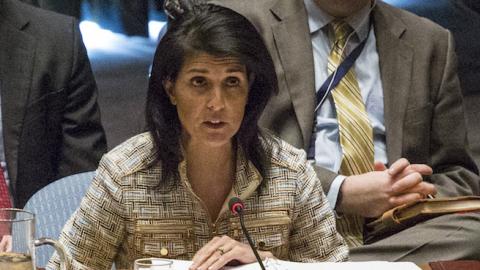Ambassador Nikki Haley got off to a good start at the United Nations last week. After a Security Council session on the Middle East—which focused solely on criticism of Israel—she offered a review that was the most honest I have ever heard from a U.S. diplomat. “The United States will not turn a blind eye to this anymore,” she said. “I’m here to emphasize the United States is determined to stand up to the U.N.’s anti-Israel bias, and we will push for action on the real threats we face from the Middle East.”
Congress could back her up. Last year $9.2 billion of American tax dollars went to the U.N.—$659 million to cover 22% of the U.N.’s annual operating budget, $2.6 billion toward peacekeeping and a “voluntary” contribution of $5.9 billion.
If the U.N. were advancing democratic values or making the world safer, the money would be well-spent. A new U.S. administration and new U.N. secretary-general provide a golden opportunity to help the U.N. return to its core values, challenge its inefficiency, and halt its frequent attacks on American values and allies. The message should be clear: the U.N. must reform or the U.S. could cut its funding. An action plan along these lines involves three stages:
• Transparency. Ms. Haley should appoint a special delegate to the U.N. budgetary committee, to monitor the purposes for which the U.N. and its agencies are using American funding. The U.N. currently has no obligation to provide its funders with detailed annual reports on the use of their funds based on global accounting standards and supervised by a third-party auditor. The relationship is based on “expectations” to report and “appreciation” of efforts. That’s not good enough for a small business filing its taxes. For an organization spending billions it’s ridiculous.
• Diligence. A decade ago, after revelations of systemic abuse, the U.S. launched the U.N. Transparency and Accountability Initiative. It turned out to be all bark, no bite. Things got worse. Institutions like the Human Rights Council remained hijacked by human-rights violators like Cuba, Qatar, Saudi Arabia and Venezuela. Congress should reinvigorate the initiative, launching a new phase under which it will work alongside an independent investigator to ensure that U.N. agencies are upholding their mission statements in keeping with U.S. standards, interests and values.
• Accountability. The idea that the U.N. can police itself is a fantasy, but the states that fund it can demand a higher standard. The U.S. should flex its financial muscle. Where performance is lackluster, inefficient, corrupt or abhorrent, America could demand rapid reform. If there is no improvement, Congress must be able to withdraw funding.
The U.N. can no longer remain hostile, opaque and unaccountable and expect to get a star-spangled paycheck. Churchill defined an appeaser as one who feeds a crocodile, hoping it will eat him last. I hope Ambassador Haley’s words send the message—to Turtle Bay and Capitol Hill—that feeding time is over.



















